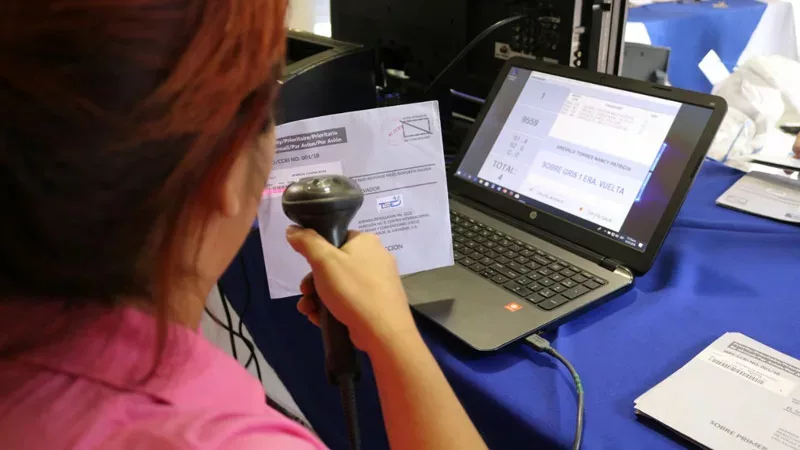Another of the aspects covered by the survey of the Dr. Guillermo Manuel Ungo Foundation (FundaUngo) is that of the vote abroad since the study shows that almost 64% of the Salvadorans consulted consider that there are risks of electoral fraud being committed using the electronic ballot that will be implemented.
This mechanism for Salvadorans in the diaspora to cast their vote has already been questioned, both by experts in computer science and electoral law, as they consider that it violates the integrity of the ballot and opens the door to possible fraud and manipulation.
Among the significant loopholes of the approved bill is that there will not be a closed electoral roll, that the company that executes the electronic voting may be hired without controls, and that the universe of voters in San Salvador will be inflated.
Regarding this list, the FundaUngo survey states that up to 48% of those surveyed disagree, or strongly disagree, with the fact that there is no list specifying how many Salvadorans living outside the borders can vote in the next elections.
Within the survey, at least 42.8% agree that such a list does not exist.
Likewise, experts have said that this modality may be vulnerable to hacks, something that already happened with another project of the current government: the Chivo, an electronic wallet that was launched to handle Bitcoin but that from the beginning gave malfunctions. Likewise, thousands of Salvadorans denounced the impersonation of their identity to collect the $30 bonus announced by the government.
For electronic voting, experts say, it is difficult to guarantee that the vote is secret, that the electoral roll is not inflated, and that the citizen who claims to be voting votes.
Curiously, 69.3% agree with the electronic voting mechanism, although almost the same number of people see the risk of fraud.
A striking fact is that 80.2% of those surveyed know little or nothing about the law that allows voting from another country, while only the remaining 19.8% say they know a little or a lot about this initiative.
Within this point, something that also worries the opposition is that the vote abroad would not have the respective vigilance of the political parties. This divides the opinion of Salvadorans almost equally since while 48.8% agree, another 48% disagree.
On the other hand, 55.9% of Salvadorans consider that the Supreme Electoral Tribunal (TSE) is not prepared to implement electronic voting within the framework of the new law on the external ballot.
Regarding this risk of fraud, TSE magistrate Noel Orellana assured last week that “a company will be hired to execute the vote abroad that guarantees voters that their vote will be reliable, safe, secret and auditable.”
El 63.5% de los salvadoreños considera que hay riesgo de fraude con el voto electrónico en el exterior
Otro de los aspectos que abarcó la encuesta de la Fundación Dr. Guillermo Manuel Ungo (FundaUngo) es el del voto en el exterior, pues el estudio arroja que casi el 64% de los salvadoreños consultados considera que hay riesgos de que se cometa fraude electoral por medio del voto electrónico que se implementará.
Este mecanismo para que los salvadoreños de la diáspora puedan emitir su voto ya ha sido cuestionado, tanto por expertos en informática como en derecho electoral, pues consideran que se vulnera la integridad del voto y se abre la puerta a posible fraude y manipulación.
Entre los grande vacíos del proyecto de ley aprobado, está que no habrá un padrón cerrado, que se podrá contratar sin controles a la empresa que ejecute el voto electrónico, que se infla el universo de votantes en San Salvador.
A propósito de ese padrón, la encuesta de FundaUngo sostiene que hasta un 48% de los encuestados está en desacuerdo, o muy en desacuerdo, con que no existe una lista que especifique cuántos salvadoreños de los que viven fuera de las fronteras pueden votar en las próximas elecciones.
Dentro de la encuesta, al menos un 42.8% está conforme con que esa lista no exista.
Asimismo, los expertos han dicho que esta modalidad puede ser vulnerable a hackeos, algo que ya sucedió con otro proyecto del gobierno actual: la Chivo, billetera electrónica que se lanzó para manejar Bitcoin pero que desde el inicio dio errores de funcionamiento. Asimismo, miles de salvadoreños denunciaron la suplantación de su identidad para cobrar el bono de $30 que anunció el gobierno.
Para el voto electrónico, dicen los expertos, es difícil garantizar que el voto sea secreto, que no se infle el padrón y que realmente vote el ciudadano que dice estar votando.
Curiosamente, 69.3% está de acuerdo con el mecanismo de voto electrónico pese a que casi la misma cantidad de personas ve el riesgo de que exista un fraude.
Un dato que llama la atención es que un 80.2% de los encuestados conoce poco o nada sobre la ley que permite realizar el sufragio desde otro país, mientras que solo el 19.8% restante afirma conocer algo o mucho acerca de esa iniciativa.
Dentro de este punto, algo que también preocupa a la oposición es que el voto en el exterior no contaría con la respectiva vigilancia de los partidos políticos. Esto divide casi en partes iguales la opinión de los salvadoreños, pues mientras un 48.8% está de acuerdo, otro 48% no lo está.
Por otra parte, el 55.9% de los salvadoreños considera que el Tribunal Supremo Electoral (TSE) no está preparado para implementar el voto electrónico en el marco de la nueva ley de voto exterior.
Con respecto a ese riesgo de fraude, el magistrado del TSE Noel Orellana aseguró la semana pasada que “se va a contratar una empresa para ejecutar el voto en el exterior que le garantice al votante que su sufragio sea confiable, seguro, secreto y auditable”.

